Mitchell Hadley's Blog: It's About TV!, page 118
May 2, 2020
This week in TV Guide: May 4, 1974
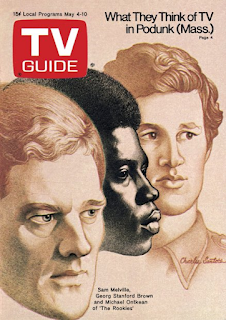 Podunk, the dictionary tells us, is "An imaginary small town, taken as typical of placid dullness and lack of contact with the progress of the world." Granted, that sounds to me a lot like the World's Worst Town™, except it's noted that this is a "humorous name," whereas my appellation is full of malice. Be that as it may, Neil Hickey, after listening to network executives talk about how the "gruel, treacle and drivel" often seen on television is "what Americans want" ("If they wanted quality, we'd give them quality.") decided to travel to Podunk to find out if this is so.
Podunk, the dictionary tells us, is "An imaginary small town, taken as typical of placid dullness and lack of contact with the progress of the world." Granted, that sounds to me a lot like the World's Worst Town™, except it's noted that this is a "humorous name," whereas my appellation is full of malice. Be that as it may, Neil Hickey, after listening to network executives talk about how the "gruel, treacle and drivel" often seen on television is "what Americans want" ("If they wanted quality, we'd give them quality.") decided to travel to Podunk to find out if this is so.Podunk, in this case, is a village just outside of East Brookfield, Massachusetts . The name was made famous by George M. Cohan, who spent summers there with his relatives, and loved the area. (See, I told you it was different than the World's Worst.) About 100 people live in Podunk, and Hickey spent a few days moving among them, asking what they thought about television. Now, before we go any further, it should be noted that Podunk has no lack of stations from which to choose; they get six from Boston, two from Providence, and one each from Worcester, Hartford, and Manchester, so this should be a fair test.
John Treadwell, a farmer, isn't shy about what he thinks. "I'm too apt to fall to sleep when I watch the TV," he says. "Daytime TV is ghastly, anyway. Soap operas are for idiots. And the nighttime shows are all the same—police and crime." Overall, he says, "Not only is there no intellectual stimulation on television, but you get fat going to the refrigerator during all those commercials." Mr. and Mrs. Alva Silliman used to watch TV all the time, but don't anymore. "We liked Arthur Godfrey and Ed Sullivan, but they're not on any more," Mrs. Silliman says, and her husband chips in with a critique of reruns. "They must really be hard up for programs if they keep showing the same ones over and over." Mrs. Silliman is particularly concerned about the violence and sex on TV, and its effect on youth. "A lot of that stuff gets to your young folks. It's not good for them." As for the way women dress, "you can see women in low-cut dresses almost losing what they've got."
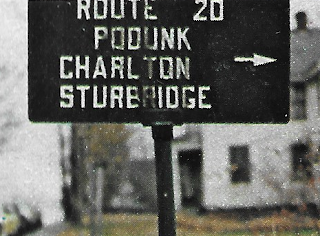 These are by no means unique opinions in Podunk. Says the Rev. Leslie Edwards, who divides his time between circuit preaching and house painting, "[T]here's no hunger in my heart to sit down and look at the kind of fiction they have on television." Mr. Joe Perry, superintendent of streets and tax collector, is partial to John Wayne movies, but otherwise says of TV, "They can throw it away." Like the others, he's concerned about violence, but more disturbed by increasing sexual content. "You don't have to push in front of them. They're shown a picture before they even learn the words. Maybe it's just the way I was brought up." He's also irritated by the patronizing manner of network newscasters. "Anybody who gives the news to the public should just tell us what's going on and let us make up our own minds. They seem to believe that the public doesn't have enough intelligence to think for themselves." Mr. Fred McCrillis underscores a point that we'll return to later: "I think the quality of TV has gone down, like the quality of movies. And that's too bad because television comes right into your home."
These are by no means unique opinions in Podunk. Says the Rev. Leslie Edwards, who divides his time between circuit preaching and house painting, "[T]here's no hunger in my heart to sit down and look at the kind of fiction they have on television." Mr. Joe Perry, superintendent of streets and tax collector, is partial to John Wayne movies, but otherwise says of TV, "They can throw it away." Like the others, he's concerned about violence, but more disturbed by increasing sexual content. "You don't have to push in front of them. They're shown a picture before they even learn the words. Maybe it's just the way I was brought up." He's also irritated by the patronizing manner of network newscasters. "Anybody who gives the news to the public should just tell us what's going on and let us make up our own minds. They seem to believe that the public doesn't have enough intelligence to think for themselves." Mr. Fred McCrillis underscores a point that we'll return to later: "I think the quality of TV has gone down, like the quality of movies. And that's too bad because television comes right into your home."And so it goes on. "Of the several score interviewees," Hickey says, "none was unrestrainedly pleased with the quality of television entertainment." And, it should be noted, Podunkians are "articulate, opinionated and well-informed." They also understand that there's more to life than television. Mrs. Silliman mentions the beauty of the area, especially in the fall; the majestic stand of red spruce and oak trees visible from the Silliman home means "you can look out that window and see all the color you need. We don't need TV." And although I'm inclined to disagree when Mr. McCrillis says that there's "so much more to an evening than television," it's a point well taken.
Podunk, as a recognized geographical area, no longer exists, swallowed up by East Brookfield, but it was real, as were the opinions expressed by the citizens who, according to the suits in the corporate offices, "don't care about quality television," But then, as now, it's so easy for those on the coasts to overlook the rest of America. Isn't it?
t t t
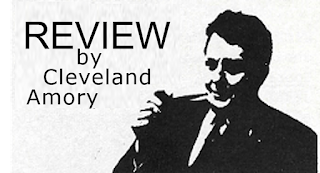
Throughout the 60s and early 70s, TV Guide's weekly reviews were written by the witty and acerbic Cleveland Amory. Whenever we get the chance, we'll look at Cleve's latest take on the series of the era.
"If we can have 4,003 shows about the police," Cleveland Amory writes, "will we say nay to just one about fireman?" The show in question is not, as you may think, Emergency!, but ABC's Firehouse, starring James Drury, Richard Jaeckel, and Michael Delano. And, says Cleve, Firehouse is better than most of those 4,003 police shows. For one thing, they actually try to develop relationships between the characters, rather than having them play second fiddle to various disasters. "Of course, these relationships aren't particularly interesting, but no matter. The point is, they're there." The characters aren't very well developed either, but the series compensates by giving us five leads.
So much for the good news. "The basic trouble is that Firehouse is so pat that it's not only almost unbelievable, it is unbelievable." You're guaranteed at least one little fire and one big fire in every episode, and you're not guaranteed that either one of them will be interesting. For example, one week we start with a small fire at the shop of a poor seamstress, followed by a big fire that destroyed the studio of a top designer, portrayed by guest star Rudi Gernreich (playing himself). Everything's been destroyed; not to worry, though; he's just glad nobody got hurt. "'How can I ever find a way to express my gratitude?', he reads off the cue card. 'I think there's a way,' one of the firemen tells him. 'There's a seamstress who needs a good job.' Our heart went pit-pat." See what I mean? In another episode, J. Pat O'Malley plays an old man who won't abandon his fire-threatened collection of old movies. The episode's guest star goes in to get him. "It shows kindness," he tells her as the flames threaten them both, "and thoughtfulness." Apparently kindness and thoughtfulness extends to putting someone's life at risk.
I think that almost all kids are fascinated by fire engines and firemen, or at least they were when I was a kid. I was always impressed by the class trip to the fire station, which struck me as an enormously impressive place full of trucks, ladders, hoses, and other equipment. And that, says Amory, is the problem with Firehouse: "it fails utterly to capture the lure of the firehouse." It could use some old-timers, talking about what it was like fighting a fire without today's modern equipment; the show is "so with-it that it's without anything else." Worst of all, for animal-lover Amory: no Dalmatian. Couldn't they at least have that, for Pete's sake?
t t t
 Not only do we have NBC's The Midnight Special and ABC's In Concert this week, there's also the syndicated Don Kirshner's Rock Concert. Not only that, we've got two different versions of Kirshner! Let's see who's better, who's best.
Not only do we have NBC's The Midnight Special and ABC's In Concert this week, there's also the syndicated Don Kirshner's Rock Concert. Not only that, we've got two different versions of Kirshner! Let's see who's better, who's best.Kirshner I: The Allman Brothers Band joins Wet Willie, the Marshall Tucker Band and Martin Mull.
Kirschner II: Guests include Ike and Tina Turner, Redbone, and Michael Stanley.
Midnight Special: Comedian George Carlin is the host. Guests include Buffy St. Marie, Waylon Jennings, Livingston Taylor, the Dramatics, Leo Sayer, and Puzzle.
In Concert: The first of four programs taped at "California Jam" April 6. Acts include Emerson, Lake and Palmer; Deep Purple; Eagles; Seals and Crofts; Rare Earth; Black Oak Arkansas; Earth, Wind and Fire and Black Sabbath.
It's hard to compare this week's shows; three music shows in a studio vs. a concert held before 200,000 fans at Ontario Motor Speedway in California. I'm going to throw Midnight Special and Kirshner II (Saturday, 11:15 p.m., KOVR in Sacramento) out right away, leaving us with Kirshner I (Saturday, 11:00 p.m., KRCR in Redding) and In Concert. Kirshner I has a higher percentage of stars, but In Concert has a larger number. What to do, what to do. Watch 'em both, of course! This week is a Push.
t t t
It's that time of year when the networks start to discuss the new fall season, and I hope you aren't too comfortable with what you've been watching, because you're in for a big change this fall. Richard K. Doan headlines the story "Massive Changes," which is a pretty good way to describe a new season that will include 30 new series. And to make way for those new series? As I often say in the Monday listings, see if you can find your favorites from among the soon-to-be canceled:
CBS: Dirty Sally, Hawkins, Shaft, Here's Lucy, The New Dick Van Dyke Show, The Sonny and Cher Comedy Hour, The CBS Tuesday Night Movie.
NBC: Hec Ramsey, The Magician, Banacek, The Snoop Sisters, Tenafly, Faraday and Company, Chase, The Flip Wilson Show, The Dean Martin Comedy World, The Brian Keith Show, Lotsa Luck, The Girl with Something Extra, Music Country U.S.A., NBC Wednesday Night at the Movies.
ABC: The FBI, Owen Marshall, The Brady Bunch, The Partridge Family, Toma, Doc Elliot, The Cowboys, Chopper One, Firehouse, ABC Suspense Movie.
Some pretty big-name, long-running shows included in that list, aren't there? We'll see some familiar names in the list of replacements, as well. For example, NBC is offering Little House on the Prairie, The Rockford Files, Lucas Tanner, Movin' On (which is still known as In Tandem at this point), Petrocelli, Chico and the Man, and Police Woman ("possibly with Elizabeth Ashley," and how different would the series have been if that had happened?); CBS boasts Rhoda, Planet of the Apes, and Paul Sand in Friends and Lovers; and ABC introduces Harry O, The New Land, Get Christy Love!, Kolchak—The Night Stalker, Paper Moon, The Sonny Comedy Revue, and That's My Mama. Some of them are major hits, some barely more familiar than the shows they replaced, and some (The Love Nest, starring Florida Friebus and Charles Lane) never make it to the schedule.
t t t
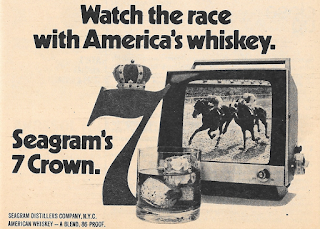 The highlight of the week in sports has to be the landmark 100th running of the Kentucky Derby, live from Churchill Downs in Louisville. (2:00 p.m. PT, CBS) The centennial Run for the Roses will feature the largest field in history (23 horses) and a then-record crowd of over 160,000, and when it's all over, the winner is a horse that doesn't really go down in history: Cannonade, who goes on to finish third in both the Preakness and the Belmont Stakes.
The highlight of the week in sports has to be the landmark 100th running of the Kentucky Derby, live from Churchill Downs in Louisville. (2:00 p.m. PT, CBS) The centennial Run for the Roses will feature the largest field in history (23 horses) and a then-record crowd of over 160,000, and when it's all over, the winner is a horse that doesn't really go down in history: Cannonade, who goes on to finish third in both the Preakness and the Belmont Stakes.We're also seeing the climax of the winter sports playoff schedule in both basketball and hockey. Yes, I know it's only May 4, and nowadays each sport goes on for at least six more weeks, but trust me when I say things were different then. (You should, by now; I've said it often enough.) On Sunday, Milwaukee takes on Boston in Game 4 of the NBA finals (11:30 a.m., CBS), while Philadelphia hosts the New York Rangers in the seventh game of the NHL's Eastern Division finals (1:00 p.m., NBC) The Bucks defeat the Celtics 97-89 to even up their series at two games apiece, while the Flyers defeat the Rangers, 4-3, to advance to the Stanley Cup final against the Boston Bruins.
Our handy programming note informs us that CBS plans to telecast Games 5 and 6 on Tuesday and Friday, if necessary—and they are necessary, especially the magnificent Game 6 in Boston, where the lead changes hands three times in the final 24 seconds of the second overtime before Milwaukee pulls it out, 102-101 to force Game 7 (which Boston wins). The American Basketball Association also makes prime time this week, with the Utah Stars facing the New York Nets in the second game of the finals (7:00 p.m., KTXL on a tape delay). The Nets, behind the incomparable Julius Erving, take a 118-94 victory on the way to a five-game triumph and their first ABA title. Meanwhile, although we're advised that NBC may broadcast a Cup final game in prime time, they don't; we'll have to wait for Game 3 next Sunday. Then as now, hockey winds up playing second fiddle.
And some notable programming this week: Monday at 11:30 a.m. on ABC, it's the premiere of Dick Clark's The $10,000 Pyramid, an enduring game show that continues in various formats, right up to this day; if you want to win some kind of bet, Anne Meara and Soupy Sales are the inaugural celebrity guests. On Monday night, Peter Graves stars as Ross Macdonald's private eye Lew Archer in The Underground Man (9:00 p.m., NBC); the character is probably better-known to the moviegoing public as "Harper," played by Paul Newman in a pair of quality big-screen movies. Opposite that, it's America's Junior Miss Pageant (9:00 p.m., CBS), hosted by Michael Landon. The winner, Karen Morris*, goes on to play Dr. Faith Coleridge Desmond (one of many actresses to do so) on Ryan's Hope; the organization, which still exists, is now known as the Distinguished Young Women organization.
*Fun fact: Karen Morris is married to the son of announcing great Curt Gowdy, who in 1974 is celebrating his 25th anniversary as a sportscaster.
t t t
Judith Crist leads off her column with a a review that's more like a commentary. Here it is; then we'll talk about it.

For a quickie course in what happened to a certain kind of movie, to American morality and to director John Huston over a 30-year period, refresh your memory of Huston's 1941 The Maltese Falcon and then compare it with his 1970 The Kremlin Letter, the one theatrical prime-time premiere of this network-movie week. It's all there in this film based on Noel Behn's thriller: the complete dehumanization of the private agent, the super-coldness of the spy, the replacement of human relations by physical violence and/or sexual activity, the obfuscation of individual responsibility with tired mouthings of amorality, the substitution of banality for logic, and the assumption that if we're presented with enough "names," enough glossy location shooting and enough glimpses of oo-naughty! glamour (all of which may not survive to the small screen), we are going to accept the whole dumb mess as entertainment. Are you?
I don't think she liked it, do you? More than that, though, Crist hits upon something that plagues television—and all entertainment, for that matter. Call it cynicism, nihilism, what have you, but Crist nails it with her repeated emphasis on the lack of humanity. (Of course, one of the other problems is that Crist proceeds from the assumption that qualities such as logic, individual responsibility, and human relations are actually good, and there'd be people today who disagree with that.)
The other night, as we were watching The Eleventh Hour, my wife commented on how the psychological drama is a metaphor for what we're going through now. One of the keys to this series is that, as the doctors look to get at the heart of their patients' problems, they have hope that their treatment will succeed, that, even if the patient isn't cured, he or she will at least be able to enjoy a vastly improved quality of life. This particular episode ("Angie, You Made My Heart Stop") ends uncertainly; as Angie is to begin her therapy, the doctors are confident she'll recover, but there are no guarantees, and we aren't around to see how it all turns out. Differentiate that hope, cautious though it may be, with the darkness that pervades some of the top dramas on TV today—as, in fact, it does with contemporary society in general. We have as many antiheroes as heroes, "realism" takes precedence over all, and we use terms such as "gritty" to describe situations that often reek with the qualities I mentioned above: cynicism, nihilism, brutality and inhumanity. Meanwhile, reality television often puts our least admirable qualities on display for all to see—greed, materialism, selfishness, lust, self-centeredness, and stupidity—and participants, far from being embarrassed or ashamed, glory in the attention (and the financial compensation).
I'm trying not to paint all of today's television with a broad brush; there are plenty of shows that offer more positive outlooks, even inspiring ones. But as the Podunk article shows, there's plenty of concern about the content of television in 1974, of what could be seen as a collapse of traditional values in favor of more explicit portrayals of sex, violence, and drugs, along with news bias. Too often, people who talk about the "new" Golden Age of Television miss one point, something I find essential. The television of today might be just as dramatic, just as powerful, as those of yesteryear. But back then it was permissible to believe in hope. Today, far too often, they don't believe in anything. TV

Published on May 02, 2020 05:00
May 1, 2020
Around the dial
 One thing we can surely use nowadays is positive thinking, and David has a thought at Comfort TV that is both positive and comforting:
no one can take classic TV away from us
. "The ability to watch a great series from the past is not impacted by season, by weather, by labor disputes, by travel restrictions, or even by global pandemics."
One thing we can surely use nowadays is positive thinking, and David has a thought at Comfort TV that is both positive and comforting:
no one can take classic TV away from us
. "The ability to watch a great series from the past is not impacted by season, by weather, by labor disputes, by travel restrictions, or even by global pandemics."At The Twilight Zone Vortex, this week's sojourn into the TZ comic book comes from May, 1963. It's called "The Last Battle," and let's hope that's not a prophetic title! Thanks to Jordan for bringing these to us!
"The Sergeant Wore Skirts" wouldn't fit very well into the story of that last battle, would it? But, as Hal points out at The Horn Section, it's a perfect fit for this week's look at Love That Bob! Bob does get himself into some situations, doesn't he?
Jodie has some fun tidbits from the life of Dave Garroway at Garroway at Large, from a sleek car to help for balding heads. I should have such thin hair.
The new frontier in this week's Television's New Frontier: the 1960s is the 1961 season of The Joey Bishop Show , the first for the series. If you're a fan of the show, you might not recognize it in this incarnation; the premise and supporting cast changes for the next season, even though the first is also the most successful in terms of ratings.
At TV Confidential, you can now find part one of Ed Robertson's interview with Donna Mills , now available for on-demand listening.
Tomorrow, return to a time that seems simpler in retrospect, although it might not have been that way at the time, with another TV Guide. TV
Published on May 01, 2020 05:00
April 29, 2020
The Monsters
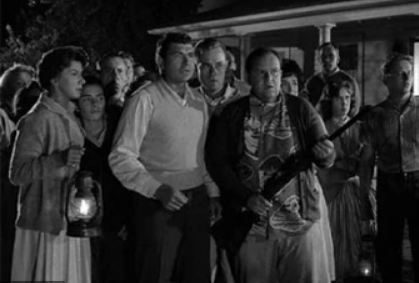 On March 4, 1960, "The Monsters Are Due on Maple Street," the twenty-second episode of The Twilight Zone, aired on CBS. Viewers who've watched The Twilight Zone will remember the episode vividly (it's considered one of the show's greatest stories); even those who haven't watched the series may well have heard of it.
On March 4, 1960, "The Monsters Are Due on Maple Street," the twenty-second episode of The Twilight Zone, aired on CBS. Viewers who've watched The Twilight Zone will remember the episode vividly (it's considered one of the show's greatest stories); even those who haven't watched the series may well have heard of it.The story, written by Rod Serling, takes place in a close-knit neighborhood on Maple Street, in an unnamed city. Strange things begin to happen (flashing lights, power outages, and the like), and the fractures develop between the once-close neighbors as, fueled by fanciful science-fiction stories, they become convinced one of them part of an alien invasion of Earth. (Remember, this is The Twilight Zone we're dealing with.) Eventually, a mob mentality takes hold of the neighborhood, there's a death, accusations fly (along with bullets and rocks), and the the neighborhood devolves into a riot.
There are no monsters, of course—or, rather, there are monsters; they just aren't playing the role we suspect. They are watching the disintegration of civilized behavior on Maple Street from a hillside where their spaceship landed. They haven't come near the street; all they've done is cause a few lights to flash and the power to go on and off, and the humans did the rest. They observe how they'll be able to colonize Earth neighborhood by neighborhood, and we'll make it possible: all they have to do is fiddle with the expected, to "take away human comforts and throw in an element of fear and humans will seek out their natural enemy: themselves." That quote comes from The Twilight Zone Vortex , and it's as good as you'll find.
Allegorical interpretations abound. Serling clearly intends this to be one of his "message" scripts; his closing narration states that "thoughts, attitudes, prejudices" are weapons found only in our minds, and that "prejudices can kill...and suspicion can destroy...and a thoughtless, frightened search for a scapegoat has a fallout all of its own—for the children and the children yet unborn." It could be a warning about racism. It could be a treatise on the Red Scare. And it's timeless: it could be about terrorism, immigration—even COVID-19.
Have you noticed how people are being urged to "snitch" on people they see violating the norms of "social distancing"? (And boy, I'll be happy to never see or hear that Newspeak term again.) We hear of cases of social media ridiculing individuals who fail to join in nightly neighborhood celebrations of health workers. And predictably, the response to the virus has divided along political and ideological lines. Liberals and conservatives, Republicans and Democrats, red states and blue, make claims, exchange accusations, and hurl invective. Those who claim to be protecting lives are called tyrants; those who claim to be protecting jobs are called traitors. If we don't close everything up, people will die. If we don't open everything up, people will die. And, as is always the case, anyone who disagrees with us is a fool. We're in this together? Give me a frigging break.
If there's one thing we've learned in the last decade or so, it's that social media presents a highly distorted view of society, and so it's possible that the nation really has attained a level of unity not seen since World War II. It's possible. But it will be interesting to see what kind of world we live in when this pandemic ends. Will the businesses forced to close ever reopen, and will the workers laid off regain their jobs? Will the public scolds keep at it, or will they go back into their dark holes? Will things get back to normal, or is this, as some people have suggested, the "new" normal? What will the future be like?
In one of his more memorable quotes, Harry Reasoner, the CBS and ABC newsman, once cautioned against a society pursuing hypersafety:
The idea of trying to outguess life, to avoid everything that might conceivably injure your life, is a peculiarly dangerous one. Pretty soon you are existing in a morass of fear. A man makes a sort of deal with life, he gives up things because they are undignified or immoral; if life asks him to cringe in front of all reasonable indulgence, he may at the end say life is not worth it. Because for the cringing he may get one day extra or none; he never gets eternity.
I think we've forgotten that; in fact, I'm not sure how many of today's generations ever even considered this. We react today to life, and to our fellow man, with fear and paranoia. But as Reasoner says, danger comes in different disguises. Some might say that, in the panic of the moment, it is too dangerous to consider the the post-virus future. If not now, though, when? The future is only one second away; if we keep putting it off, we'll only guarantee that the present remains the same. And then who will The Monsters be? TV
Published on April 29, 2020 05:00
April 27, 2020
What's on TV? Saturday, April 25, 1953
 I'm going to do a little cutting-and-pasting to give you a visual of something you'd never see in a TV Guide of the 1990s: the listings for an entire day of television, contained in four columns. Of course, this is what happens when you only have four stations, and the earliest program starts at 9:30 in the morning. Chicago may be a toddlin' town; that must mean even the TV people need to sleep in on Saturdays.
I'm going to do a little cutting-and-pasting to give you a visual of something you'd never see in a TV Guide of the 1990s: the listings for an entire day of television, contained in four columns. Of course, this is what happens when you only have four stations, and the earliest program starts at 9:30 in the morning. Chicago may be a toddlin' town; that must mean even the TV people need to sleep in on Saturdays.
4 WBBM (CBS)
10:00 THERE’S ONE IN EVERY FAMILY
10:30 ROD BROWN OF THE ROCKET RANGERS—Drama
11:00 BIG TOP—Circus Fun
12:00 OPERATION NEW HORIZONS
12:30 “FUGITIVE VALLEY”MOVIE
2:00 NEW WESTERN THEATER—Film
2:30 MOVIE—Title to be announced
4:00 CLASSIC THEATER—Music“Marechiaro,” part 1
5:00 FARMTOWN U.S.A.—Talks
5:30 WEEKEND NEWS—Report
5:45 FILM
6:00 STORK CLUB—Interviews
6:30 BEAT THE CLOCK—Games
7:00 JACKIE GLEASON SHOW
8:00 PLAY OF THE WEEK—Drama“Drawing Room A”
8:30 MEET MILLIE—Comedy Skit
9:00 QUIZ KIDS—Joe Kelly, Emcee
9:30 IT’S NEWS TO ME—Panel Quiz
10:00 “SWAMP FIRE”MOVIE
11:10 LATE WORLD NEWS
11:25 HUTCHINSON WAX
11:35 “MEDAL FOR THE GENERAL”MOVIE
I like how Meet Millie is referred to as a "comedy skit." It was, in our terms, a situation comedy. I think of a skit as being more what you'd see on The Jackie Gleason Show at 7:00 p.m. Different strokes for different folks, I guess.
5 WNBQ (NBC)
12:00 “BAD MAN FROM BIG BEND”MOVIE
2:00 NATURE OF THINGS—Science
2:15 MEET THE VEEP—Discussion
2:30 AMERICAN INVENTORY“How To Get Rich”
3:00 TOP STAKES RACESWood Memorial
3:30 NBC TELEVISION OPERA“Der Rosenkavalier,” part 1
5:00 RELIGIOUS PUPPET FILM
5:00 HOBBY TIME—Bill Healion
5:30 JET PILOT—Aviation Show
6:00 MR. WIZARD—Science Study
6:30 ETHEL & ALBERT—Comedy
7:00 MY HERO—Situation Comedy
7:30 ORIGINAL AMATEUR HOUR
8:00 YOUR SHOW OF SHOWS
9:30 YOUR HIT PARADE—Musical
10:00 “NEW ORLEANS”MOVIE
11:30 FACES IN THE WINDOW
Der Rosenkavalier is one of the very few—perhaps the only?—operas to be presented over two parts on NBC Opera Theatre. It's one of Richard Strauss' longer operas, but even at that I'm a little surprised that they decided to stretch it out over two weeks rather than make some of the major cuts they've been known to do. Here's part one on YouTube as it was broadcast; part two is available as well.
7 WBKB (ABC)
9:30 “FIGHTING MUSTANG”
10:00 SPACE PATROL—Adventure
10:30 SKY KING—Wester Story
11:00 BEULAH SHOW—Comedy 11:30 “WAGON TRAIL”MOVIE
12:00 “WOLF CALL”MOVIE
1:00 “TROUBLE AT MELODY MESA”MOVIE
2:00 “WATER RUSTLERS”MOVIE
3:00 “BRAND OF THE DEVIL”MOVIE
4:00 “DEVIL RIDERS”MOVIE
5:00 SATURDAY LAUGH TIME—Film
5:30 ROOTIE KAZOOTIE—Puppets
6:00 PAUL WHITEMAN’S TEEN CLUB
6:30 WHAT’S THE ANSWER?—Quiz
7:00 “DUDES ARE PRETTY PEOPLE”MOVIE
8:00 BOXING BOUTSTommy Harrison vs Wes Bascom
9:00 HEART OF THE CITY—Drama
9:30 “KNIGHT WITHOUT ARMOR”MOVIE
11:00 SOMETHING NEW
11:15 “MAGIC BOW”MOVIE
12:30 COMEDY CAMEO—Film Short“The Adventurer”
I don't want to touch that 7:00 p.m. movie with a ten-foot pole.
9 WGN (DUMONT)
10:00 KIDS’ CAMERA CORNER—Film
10:30 KIDS & COMPANY—Variety
11:00 TERRY AND THE PIRATES 11:30 MORNING MOVIE TIME—Film“Reckless Buckaroo”
1:00 BATTING PRACTICE—Creighton
1:10 LEAD OFF MAN—Vince Lloyd
1:25 BASEBALL—Cubs vs St. Louis
3:30 TENTH INNING—Interviews
4:00 CAMERA CARAVAN—Film
4:45 “GHOST OF HIDDEN VALLEY”MOVIE
6:00 “VIGILANTES ARE COMING”MOVIE
6:30 HOMES FOR BETTER LIVING
6:45 TALENT TIME—Variety
7:00 PATHWAYS OF THE WORLD
7:15 CHRISTOPHER FILM SHORT
7:30 THIS IS THE LIFE—Drama
8:00 YOUR SENATOR’S REPORT
8:15 PATHWAYS OF THE WORLD
8:30 WRESTLING FROM MARIGOLD
11:00 “THE COBRA STRIKES”MOVIE
12:30 NEWS—Up-To-The-Minute Data
One of the great things about the internet is that you can find out things you never thought you'd want to know. For instance, until I started working on this piece, I had no idea I'd want to find out the score of the Cubs-Cardinals game that was played today. The Cubs won 10-6 before 13,435 at Wrigley. The game was played in less than two and-a-half hours; today, that same game would probably take at least another hour. Progress isn't everything. TV
Published on April 27, 2020 05:00
April 25, 2020
This week in TV Guide: April 24, 1953
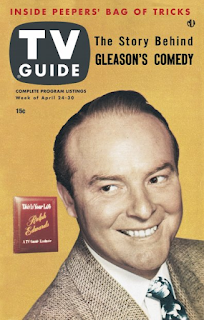 A couple of weeks ago, when I wrote about the issue with Eve Arden on the cover, one of our readers commented that it was too bad I didn't write anything about her. Well, you know how it is—time and space, and I'm not talking about Doctor Who. I like Eve Arden too, and I love her sense of humor, especially her delivery. Well, I get a second chance this week: she's mentioned as one of the "Funny Females" that can be found all over the airwaves. Not just Arden, but Lucy, Imogene Coca, Gracie Allen, Gale Storm, and others. Which raises the question: why are there so many funny women on TV?
A couple of weeks ago, when I wrote about the issue with Eve Arden on the cover, one of our readers commented that it was too bad I didn't write anything about her. Well, you know how it is—time and space, and I'm not talking about Doctor Who. I like Eve Arden too, and I love her sense of humor, especially her delivery. Well, I get a second chance this week: she's mentioned as one of the "Funny Females" that can be found all over the airwaves. Not just Arden, but Lucy, Imogene Coca, Gracie Allen, Gale Storm, and others. Which raises the question: why are there so many funny women on TV?Dr. Bergen Evans, who moderates the show Down You Go, thinks that it's because women can succeed faster in television than in other, male-dominated professions. You see, afternoon soaps, which have a dominant female audience, thrive on "weak male characters and strong women." When hubby comes home, however, they have to revert to "chiefly comic" roles. "They will have to be attractive but giddy, blundering with charming impetuosity from one absurdity to another, to be rescued at last by the superior and forgiving male. That will make hubby beam." He's speaking partly with tongue-in-cheek, but I think there's something to this; We know stories about how men feel threatened by smart, clever women (never mind that Bogie always seemed to be attracted to them, and always seemed to get them), and that women often had to hide that intelligence in order to get ahead. But who really has the last laugh? That character that Dr. Evans is describing sounds a lot like Lucy, and she did turn out to be quite a television mogul, didn't she?
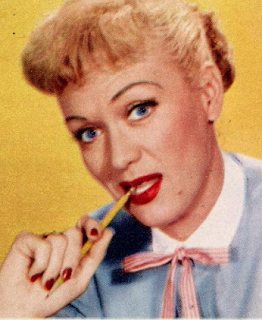 Dr. Miles Murphy, a professor of psychology, believes that women succeed in comedy because they don't face the same constraints that men do, the need that many men seem to have to appear respectable. Does this mean that comedy isn't respectable? I don't think so; I think it more likely means that women are less self-conscious than men might be about letting themselves go. Dr. Yale Nathanson, who practices psychology, looks at the ways in which women are often charged with holding families together and says that comedy is a relief, "the escape valve that lets off the pressure of responsibilities or worries." I admit, though that I'm partial to the explanation from anthropologist Ashley Montagu, who points out that "women are, on the whole, so much more appealing than men," and adds that it was inevitable that they would take over television entertainment. "Women possess the qualities of warmth and sympathy which immediately draw their fellow human beings toward them. Men may be clever, but it is the women who are good"
Dr. Miles Murphy, a professor of psychology, believes that women succeed in comedy because they don't face the same constraints that men do, the need that many men seem to have to appear respectable. Does this mean that comedy isn't respectable? I don't think so; I think it more likely means that women are less self-conscious than men might be about letting themselves go. Dr. Yale Nathanson, who practices psychology, looks at the ways in which women are often charged with holding families together and says that comedy is a relief, "the escape valve that lets off the pressure of responsibilities or worries." I admit, though that I'm partial to the explanation from anthropologist Ashley Montagu, who points out that "women are, on the whole, so much more appealing than men," and adds that it was inevitable that they would take over television entertainment. "Women possess the qualities of warmth and sympathy which immediately draw their fellow human beings toward them. Men may be clever, but it is the women who are good"As for Eve Arden, "She's witty, easy on the eyes but generally finishes second to the male." THe first two are true enough, but second best? Just because she doesn't get Mr. Boynton? My wife says she never could understand what Connie Brooks would see in him. And anyway, it's not called Our Mr. Boynton, is it?
t t t
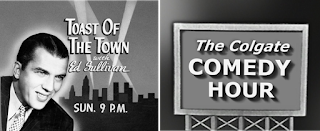 We’re always looking at Ed Sullivan’s competition around here, and in the first half of the 1950s, that competition is NBC’s Colgate Comedy Hour and its stable of rotating hosts. Colgate and Sullivan's Toast of the Town have been going head-to-head every Sunday since 1950. Let’s see how it looks this week.
We’re always looking at Ed Sullivan’s competition around here, and in the first half of the 1950s, that competition is NBC’s Colgate Comedy Hour and its stable of rotating hosts. Colgate and Sullivan's Toast of the Town have been going head-to-head every Sunday since 1950. Let’s see how it looks this week.Sullivan : Ed presents a preview of "Never Let Me Go" with Clark Gable & Gene Tierney. Guests: singers Roberta Peters & Jan Peerce; Willie West & McGinty, comedy team; and the Marquis Monkeys. Also the four Copa Girls, and comedian Wally Boag.
Comedy Hour : Bud Abbott and Lou Costello host this week, with guests Hoagy Carmichael, Teresa Brewer and the Amin Brothers.
Sullivan often presented movie previews on Talk of the Town, so you can't really consider Gable and Tierney as guests; otherwise, the competition would be pretty much over. As it is, Roberta Peters and Jan Peerce are two of the biggest stars that the Metropolitan Opera has to offer (I wonder if they were appearing together in anything that season?) Willie West & McGinty were second-generation vaudevillians carrying on an act that had been around since the turn of the century, and I'm guessing the Marquis Monkeys are better known as the Marquis Chimps. On the other hand, Abbott & Costello are big box office, and combined with Hoagy Carmichael and Teresa Brewer, that's a formidable group of headliners. Maybe if Gable was actually on with Ed. . . this week's nod goes to the Comedy Hour.
t t t
What, from this issue, speaks to us today? The man on the cover is Ralph Edwards, and in 1953 he was a TV star, with his show This Is Your Life. It began on the radio, as was the case with so many shows of the period, and after four years, in 1952, it transitioned to television. It remained on NBC until 1961, and was revived a couple of times along the way. Does the name mean much to you today? What about the idea of surprising people with the story of their life, including voices and appearances from friends, co-workers, and family? To tell you the truth, it doesn't do a whole lot for me; I don't think I'd want my life story played out in public, and this guy sure didn't .
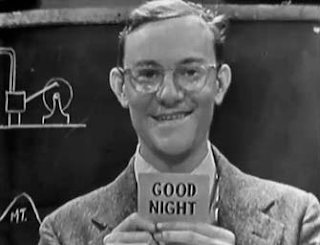 Does Mister Peepers speak to you? It had a great cast, with Wally Cox starring in the title role of the mild-mannered Robinson J. Peepers, before he became the voice of the mild-mannered Shoeshine Boy, alias Underdog. (I should ask, first; does Underdog speak to you?) You'd recognize some of the other names in the cast: Tony Randall, Jack Warden, Marian Lorne, Ernest Truax. I confess that other than scattered clips, I've never seen an episode, but I've been told that it holds up pretty well. This issue features a look at some of the gadgets that have become a trademark of the show's humor (a trick locker, a sagging gooseneck desk lamp, Peepers' shaving mirror). Of course, besides Peepers and Underdog, Wally Cox is probably best-known as one of the original regulars on The Hollywood Squares.
Does Mister Peepers speak to you? It had a great cast, with Wally Cox starring in the title role of the mild-mannered Robinson J. Peepers, before he became the voice of the mild-mannered Shoeshine Boy, alias Underdog. (I should ask, first; does Underdog speak to you?) You'd recognize some of the other names in the cast: Tony Randall, Jack Warden, Marian Lorne, Ernest Truax. I confess that other than scattered clips, I've never seen an episode, but I've been told that it holds up pretty well. This issue features a look at some of the gadgets that have become a trademark of the show's humor (a trick locker, a sagging gooseneck desk lamp, Peepers' shaving mirror). Of course, besides Peepers and Underdog, Wally Cox is probably best-known as one of the original regulars on The Hollywood Squares.And then there's Jackie Gleason, the Great One. I would like to think that he still speaks to a lot of people, but then I'd also like to think that whoever succeeded Ed McMahon as spokesman for Publishers' Clearing House is going to show up at our door any day now, and I'll welcome that person with open arms, social distancing or not. At any rate, this week's lead story goes behind the scenes to show us the writers' room, where all those great Gleason bits come from; I take some comfort from reading about how even professional writers who compose professional jokes can have writer's block, struggling to come up with an idea that takes off, especially when dealing with someone as larger-than-life as Gleason. And speaking of the Great One, it comes as no surprise that he disdains things such as rehearsals, not even bothering with the script until the day before the show. But once he gets involved, watch out; he controls everything from the music performed on the show (and how the music is performed) to the camera angles for the dance routines. Says an observer, "I've often marveled that the show ever gets off the ground. Week after week I'm frankly surprised that it does. Somebody appears to be a genius around here—and my guess is that it's Gleason."
The TV Teletype asks questions. Will he or won't he? Danny Kaye is demanding $200,000 for a three-minute guest spot on an unnamed show. "Producers are convinced he made his asking price intentionally prohibitive" because he's not ready to move to the new medium. That won't come for another decade, but when he does, he'll meet with much success. Does he or doesn't he? Red Skelton is threatening to move to ABC in the fall with a filmed show. It doesn't happen, though: Red, who's currently on NBC, instead moves over to CBS, where he'll remain until he returns to NBC in 1970. Does this speak, can you hear it?
It can be a challenge, in these early, unshaped days of television, to know what to look for, to identify that which is significant, to find what speaks to us today. It seems so long ago. And yet all these people, and those you read about below, they do speak to us. They've helped to form the cultural world we live in today; even if you haven't seen This Is Your Life, everyone knows the premise and recognizes the spoof. We live in their world, after all, and we're richer for it, whether we hear them calling us or not.
t t t
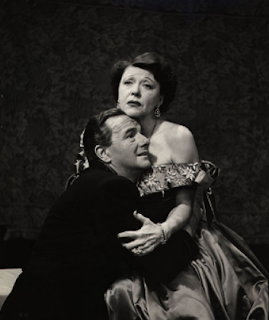 Cultural programming (i.e. the classy show) on TV isn't dead yet, and we've got several examples this week, even if they aren't in prime time. On Saturday, NBC Opera Theatre presents part one of a two-part Der Rosenkavalier, Richard Strauss' magnificent opera, at 3:30 p.m. (part two airs next week). Then, at 2:30 p.m. Sunday afternoon, NBC's back at it with a two-hour Hallmark Hall of Fame presentation of Hamlet (left), starring the great Maurice Evans (also known as Sam's father on Bewitched), Ruth Chatterton, Joseph Schildkraut, Sarah Churchill and Barry Jones; TV Guide calls it "the epitome of high level entertainment." In one of those unfortunate scheduling moments that people are always complaining about in the pre-VCR days, CBS's Omnibus (3:30 p.m.) has a terrific show of its own, including a dramatic reading from A Tale of Two Cities, a dance performance by the Ballet Russe de Monte Carlo, a look at the latest exhibition at the Museum of Modern Art in New York, and a short story by James Thurber. It's great stuff—providing you're willing to skip the last hour of Hamlet—and it's the kind of thing that you can see, if not all the time, with far more frequency than you see today.
Cultural programming (i.e. the classy show) on TV isn't dead yet, and we've got several examples this week, even if they aren't in prime time. On Saturday, NBC Opera Theatre presents part one of a two-part Der Rosenkavalier, Richard Strauss' magnificent opera, at 3:30 p.m. (part two airs next week). Then, at 2:30 p.m. Sunday afternoon, NBC's back at it with a two-hour Hallmark Hall of Fame presentation of Hamlet (left), starring the great Maurice Evans (also known as Sam's father on Bewitched), Ruth Chatterton, Joseph Schildkraut, Sarah Churchill and Barry Jones; TV Guide calls it "the epitome of high level entertainment." In one of those unfortunate scheduling moments that people are always complaining about in the pre-VCR days, CBS's Omnibus (3:30 p.m.) has a terrific show of its own, including a dramatic reading from A Tale of Two Cities, a dance performance by the Ballet Russe de Monte Carlo, a look at the latest exhibition at the Museum of Modern Art in New York, and a short story by James Thurber. It's great stuff—providing you're willing to skip the last hour of Hamlet—and it's the kind of thing that you can see, if not all the time, with far more frequency than you see today.(One of the reasons we don't see programming like this anymore is because weekends are dominated by sports. Well, this weekend all we have is a horse race on Saturday, and a pair of Cubs games Saturday and Sunday. Makes you wonder how people freaked out by the virus-induced sports meltdown would have reacted back then.)
On Monday night the classics continue, as the enduring Voice of Firestone (7:30 p.m., NBC) features opera stars George London and Dorothy Warenskjold performing hits from both opera and musical theater. There's music of another kind on Tuesday; on Dinah Shore's thrice-weekly show (6:30 p.m., NBC), Dinah "welcomes Nashville, Tennessee to the network* and goes to a senior prom, singing "Tennessee Waltz" and "Dear Hearts and Gentle People." Later on, it's Milton Berle's Texaco Star Theater (7:00 p.m., NBC), and Uncle Miltie's guests are Bob Cummings, the aforementioned Wally Cox, and Lisa Kirk. Arthur Godfrey hasn't fired Julius LaRosa yet, so you'll see him Wednesday on Arthur Godfrey and Friends (7:00 p.m., CBS), along with friends including Frank Parker, Marion Marlowe, Janette Davis, and the Maguire Sisters.
*WSM, according to Wikipedia; the radio station of the same name is home to the Grand Ole Opry.
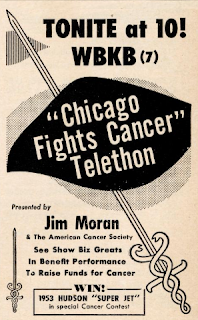 Thursday night Amos 'n' Andy (7:30 p.m., CBS) puts the Kingfish in a spot; a computer error results in a vocational guidance center grading him as an artistic genius. Next, it's Dragnet (8:00 p.m., NBC), as Sgt. Friday investigates the case of a man who apparently died from a heart attack—that is, until they find traces of poison in his system. On Friday, Dr. Bergen Evans—you remember, from the article on funny women—hosts Down You Go at 9:30 p.m. on DuMont; earlier, one of those funny women, Eve Arden, tries to help Principle Conklin make a good impression for "Board of Education Day" on Our Miss Brooks (8:30 p.m., CBS) And at 10:00 p.m., WBKB's Jim Moran hosts the fourth annual "Chicago Fights Cancer" Telethon, where you can see "Show Biz Greats" help hit a goal of $100,000 for the American Cancer Society. And who knows? You might win a
1953 Hudson
!
Thursday night Amos 'n' Andy (7:30 p.m., CBS) puts the Kingfish in a spot; a computer error results in a vocational guidance center grading him as an artistic genius. Next, it's Dragnet (8:00 p.m., NBC), as Sgt. Friday investigates the case of a man who apparently died from a heart attack—that is, until they find traces of poison in his system. On Friday, Dr. Bergen Evans—you remember, from the article on funny women—hosts Down You Go at 9:30 p.m. on DuMont; earlier, one of those funny women, Eve Arden, tries to help Principle Conklin make a good impression for "Board of Education Day" on Our Miss Brooks (8:30 p.m., CBS) And at 10:00 p.m., WBKB's Jim Moran hosts the fourth annual "Chicago Fights Cancer" Telethon, where you can see "Show Biz Greats" help hit a goal of $100,000 for the American Cancer Society. And who knows? You might win a
1953 Hudson
!t t t
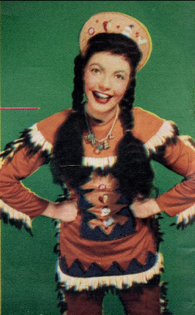 There's a nice article this week on 20-year-old Judy Tyler, aka Princess Summerfall Winterspring on Howdy Doody. You might remember her from
this 1956 issue
in which she shared the cover with Ed Sullivan; you might also remember her for the somewhat, shall we say, colorful aspects to her life that I mentioned at the time—with the kinds of details that don't make it into the pages of TV Guide, at least not in the 1950s.
There's a nice article this week on 20-year-old Judy Tyler, aka Princess Summerfall Winterspring on Howdy Doody. You might remember her from
this 1956 issue
in which she shared the cover with Ed Sullivan; you might also remember her for the somewhat, shall we say, colorful aspects to her life that I mentioned at the time—with the kinds of details that don't make it into the pages of TV Guide, at least not in the 1950s.But here all is goodness and light. The profile mentions how she's always wanted an acting career (her parents were both entertainers), and how, "[a]t a time most girls were concerned with dolls, Judy was modeling for Harry Conover. And that's not all, I want to say, but I won't. We don't, after all, know, although based on what we've learned, we can't help but wonder. But there's no question that Judy's got talent, and she's well on her way to having a big career; she's already won a national beauty contest, had her own show on WOR, and appeared in movies and as a bit player in nightclub acts. She married in 1950, when she was 18. She currently makes between $25,000 and $30,000 a year, which isn't chicken feed in 1953.
She'd just finished Jailhouse Rock with Elvis when she and her second husband were killed in an auto accident in 1957, when she was just 24. I prefer not to think of her that, or the other things; better to picture her as she is here, 20 years old, with a whole life to live and a career that seems limitless.
t t t
 There was a time—indeed, a very long time ago now—when, if something was wrong with your television, you didn't just up and buy a new one. You see, back then, TVs were—well, when they first came along they were pretty much a luxury item, and even after they became more commonplace, they were still pretty expensive relative to the amount of money the average household had. They weren't disposable items, in other words. So when something happened to your set, if the sound went bad (or you had no sound at all), or if suddenly black bars started appearing across the picture, you'd call a television repairman.
There was a time—indeed, a very long time ago now—when, if something was wrong with your television, you didn't just up and buy a new one. You see, back then, TVs were—well, when they first came along they were pretty much a luxury item, and even after they became more commonplace, they were still pretty expensive relative to the amount of money the average household had. They weren't disposable items, in other words. So when something happened to your set, if the sound went bad (or you had no sound at all), or if suddenly black bars started appearing across the picture, you'd call a television repairman.The repairman would come out to your home and remove the back of your set (as that repairman is doing at left) to see what the problem was. Televisions were made of tubes, resistors and capacitors, things that could be repaired or replaced, and it might be a case of merely changing a couple of tubes, like you might change the spark plugs on your car's engine; otherwise, he'd wind up putting the set in his truck and taking it back to the shop, where he'd repair the set and then bring it back to you, along with a bill for parts and labor.
The problem, which you would constantly be reminded of by the media, was that many television repairmen were crooks. They'd charge you for parts that didn't need to be replaced, or tell you they'd spent more time working on your TV than they actually had. They had the same reputation as auto mechanics, but since by then the television, like the family car, had become indispensable, you either asked your friends who they used or you picked a name from the phone book* and hoped for the best.
*A big book with names, addresses and telephone numbers in it. I'll tell you about it sometime.
The ad at the left is something you definitely would not have seen in any TV Guide from the past 40 years or so. There are several other ads in this issue for individual repairmen. It looks like good business to me; after all, if you're having trouble with your TV, why not trust someone who advertises in TV Guide? Notice that several of the shops offer "day & night" service, because you never know when your set might go on the fritz, and if you're like me, you're not going to want to wait until the next day to see if it can be repaired.
There's no question that times are different today; I think the last time I had a TV repaired was in 1988, and that only bought me a few more years at best. It's said that most modern televisions can be repaired, and it can save you a lot of money by having someone look at it, but I wonder if most people do that, or they just buy a new TV. Still, there's something about getting rid of an otherwise perfectly good appliance, like a television, just because a small part might not work. I hate the idea of planned obsolesce, but that kind of philosophy is itself obsolete. There's something about this ad that I like; it reminds me of my childhood, and of the shows from that time period. Just don't ask me to give up my big-screen TV. TV
Published on April 25, 2020 05:00
April 24, 2020
Around the dial
 We start the week with a couple of articles from The Ringer; first, Michael Baumann hearkens back to the days of the
opening title sequence
, for both TV and movies, and says it's time to bring them back. He's absolutely right: a great title sequence can tell you everything you need to know about a show's story and tenor—think, for instance, of The Fugitive and The FBI, two of the very best.
We start the week with a couple of articles from The Ringer; first, Michael Baumann hearkens back to the days of the
opening title sequence
, for both TV and movies, and says it's time to bring them back. He's absolutely right: a great title sequence can tell you everything you need to know about a show's story and tenor—think, for instance, of The Fugitive and The FBI, two of the very best.The other Ringer piece, by Claire McNear, has nothing to do with classic television whatsover, except insofar as to illustrate the difference between then and now. It's about Too Hot to Handle , the new Netflex reality series, which sounds as godawful as any show that's ever appeared on television. I don't think it's to strong to say that this is what the fall of Western Civilization looks like. Just don't read it on an empty stomach.
After that, I think I might need something a little stronger that a soft drink (were I a drinking man), but it's welcome nonetheless to see these pop/soda/Coke/whatever-your-region-calls-it ads from the past , courtesy of Michael's TV Tray.
At bare•bones e-zine, it's time for another Hitchcock episode from the writing duo of Morton Fine and David Friedkin, as Jack looks at the 1964 episode " The McGregor Affair ," with the great Andrew Duggan and John Hoyt among those in a standout episode that is very nasty indeed.
The Horn Section salutes the late Andrew J. Fenady , a television vet who died last weekend at the age of 91. Among his many credits are the three westerns he produced in the 1960s: The Rebel, Branded, and the series that's near and dear to Hal's heart, Hondo. R.I.P.
Another passing in the classic TV family is Tom Lesser , Eb Dawson in Green Acres, who was 81 when he died on April 20. At A Shroud of Throughts, Terence looks back on the career of the man who was the last surviving cast member from a much-loved show.
The October 1982 issue of The Twilight Zone Magazine is a best-of-1982 issue, with the greatest stories of the year, and Jordan from The Twilight Zone Vortex is here to review it all, including stories by Stephen King, George R.R. Martin, Harlan Ellison, Joyce Carol Oates, and Rod Serling himself, among others.
Last, but most certainly not least, it's time for another episode of the Eventually Supertrain podcast, as Daniel and I discuss the further adventures of Bourbon Street Beat, plus more fun features!
Steady on, and we'll be back tomorrow with—well, I don't remember what issue we're looking at tomorrow, so it will be a surprise for all of us. A good one, though. TV
Published on April 24, 2020 05:00
April 22, 2020
The 10th Season
 In my book
The Electronic Mirror: What Classic TV Tells Us About Who We Were and Who We Are (and Everything In-Between!)
, I allowed myself the conceit of calling my chapters "Channels," and since there's no such thing as Channel 1 on the dial, I began the book (after a prologue) with Channel 2 and went on from there. After all, it's a book about television; cute, eh?
In my book
The Electronic Mirror: What Classic TV Tells Us About Who We Were and Who We Are (and Everything In-Between!)
, I allowed myself the conceit of calling my chapters "Channels," and since there's no such thing as Channel 1 on the dial, I began the book (after a prologue) with Channel 2 and went on from there. After all, it's a book about television; cute, eh?It's About TV! formally began on April 20, 2011 (a summer replacement series, maybe?), which makes this the 9th anniversary. If, that is, you did things the normal way. Since that's pretty much out of the question here, and since I've already gotten away with calling chapters channels, it stands to reason that I look at every anniversary as the start of a new season. Therefore, this represents the first post (episode?) of It's About TV!'s 10th season.
There are a lot of great television series that didn't make it as far as ten: Perry Mason, The FBI, All in the Family, Little House on the Prairie and Seinfeld only made it to nine, for instance, and Bewitched and The Andy Griffith Show were good for eight. Mission: Impossible and The Mary Tyler Moore Show made it to seven. 77 Sunset Strip ran for six season, Combat! for five, and The Fugitive stopped running after four. For that matter, Police Squad! only made it through six episodes. So I figure I'm in pretty good company. Of course, Gunsmoke ran for 20 seasons, and the original Doctor Who hit 26—but don't you dare ask me about that. I think, with this being the 1,535th episode (including a few reruns), it's done better than the average blog.
When It's About TV! first started, it was as a spin-off of a general interest website that's now called In Other Words , which had been running for a few years at the time. The tables have since turned, in that It's About TV! is now the main site, and while In Other Words is still going , it's closer to being a series of occasional specials than a weekly series.
Just as a television show can't exist without viewers, a website can't exist without readers. Well, it could, but it would probably be a waste of time for the person writing it. And writing It's About TV! hasn't been a waste of time for me; I hope you don't feel it's been a waste of your time reading it. Without all of you, there'd be no reason for this spectacle, or whatever it is, to keep going.
I may have mentioned before that this experiment is probably closer to the end than it is to the beginning; classic TV itself is, after all, a finite resource. It seems as if there's always something new to say about it though, and as long as the cast continues to sign up for another season and I can maintain the high level that I demand from myself, we'll have a new season to look forward to. TV
Published on April 22, 2020 05:00
April 20, 2020
What's on TV? Monday, April 17, 1961
 It's the first day of the affiliate switch I mentioned on Saturday, with KMSP becoming an ABC affiliate, and WTCN now an independent, and Channel 9's viewers notice an immediate difference, not the least of which is tonight's live Academy Awards broadcast. While this might have seemed, at first, to be a loss for Channel 11, they'll go on to become the nation's top-rated independent station, home to well-loved reruns such as Star Trek, The Twilight Zone and Voyage to the Bottom of the Sea, as well as Mel Jass' famous matinee movie, and, in the 1970s, Merv Griffin in primetime. It also becomes the home of Minnesota professional sports, along with any kind of nationally syndicated sports. That, of course, is the WTCN I knew and loved. In many ways I think it was a mistake for them to turn to NBC affiliation (KMSP, once again an independent, assumed the role of top-rated in the nation), before becoming a Fox affiliate after the NFL deal. Independents aren't what they used to be, and none of them are quite like the old WTCN.
It's the first day of the affiliate switch I mentioned on Saturday, with KMSP becoming an ABC affiliate, and WTCN now an independent, and Channel 9's viewers notice an immediate difference, not the least of which is tonight's live Academy Awards broadcast. While this might have seemed, at first, to be a loss for Channel 11, they'll go on to become the nation's top-rated independent station, home to well-loved reruns such as Star Trek, The Twilight Zone and Voyage to the Bottom of the Sea, as well as Mel Jass' famous matinee movie, and, in the 1970s, Merv Griffin in primetime. It also becomes the home of Minnesota professional sports, along with any kind of nationally syndicated sports. That, of course, is the WTCN I knew and loved. In many ways I think it was a mistake for them to turn to NBC affiliation (KMSP, once again an independent, assumed the role of top-rated in the nation), before becoming a Fox affiliate after the NFL deal. Independents aren't what they used to be, and none of them are quite like the old WTCN.2 KTCA (Educ.)
Morning
8:30 DRIVER TRAINING—Education
9:15 YA HABLAMOS ESPANOL
9:30 DRIVER TRAINING—Education
10:15 YA HABLAMOS ESPANOL
10:30 DRIVER TRAINING—Education
11:00 YA HABLAMOS ESPANOL
Afternoon
12:30 RED MYTH—Documentary
1:00 DRIVER TRAINING—Education
1:30 SINGING TOGETHER—Grade 5
1:50 KOMM, LACH UND LERNE
2:05 DRIVER TRAINING—Education
2:30 ARITHMETIC—Grade 6
3:00 TEE AT THREE—Vivian Hoff
Evening
6:00 ADVENTURES OF DANNY DEE
6:30 FACE OF THE EARTH—Geology DEBUT
7:00 MATHEMATICS—R.C. Anderson
8:00 FUNDAMENTALS OF SPEECH
8:30 ST. THOMAS PRESENTS
9:00 UNIVERSITY REPORT—Lindsay
9:30 MUSIC—Arnold Walker
10:00 GREAT BOOKS—Discusion
10:30 BACKGROUND—Dr. Ziebarth
10:40 2 FOR PHYSICS—Science
4 WCCO (CBS)
Morning
7:00 FLYING SAUCER—Siegfried
8:00 NEWS—Richard C. Hottelet
8:15 CAPTAIN KANGAROO
9:00 NEWS—Dean Montgomery
9:10 DR. REUBEN K. YOUNGDAHL
9:20 WHAT’S NEW?—Arle Haeberle
9:30 VIDEO VILLAGE—Monty Hall
10:00 DOUBLE EXPOSURE—Dunne
10:30 YOUR SURPRISE PACKAGE
11:00 LOVE OF LIFE—Serial
11:30 SEARCH FOR TOMORROW—Serial
11:45 GUIDING LIGHT—Serial
Afternoon
12:00 NEWS—Dave Moore
12:15 SOMETHING SPECIAL—Merriman
12:20 WEATHER—Bud Kraehling
12:30 AS THE WORLD TURNS—Serial
1:00 FACE THE FACTS—Red Rowe
1:30 HOUSE PARTY—Art Linkletter
2:00 MILLIONAIRE—Drama
2:30 VERDICT IS YOURS—Drama
3:00 BRIGHTER DAY—Serial
3:15 SECRET STORM—Serial
3:30 EDGE OF NIGHT—Serial
4:00 AROUND THE TOWN—Haeberle
4:30 BOZO THE CLOWN—Children
5:00 AXEL AND DOG—Clellan Card
5:30 CLANCY THE COP—Children
5:55 SPORTS—Rollie Johnson
Evening
6:00 NEWS—Dean Montgomery
6:10 WEATHER—Bud Kraehling
6:15 NEWS—Douglas Edwards
6:30 TO TELL THE TRUTH—Panel
7:00 PETE AND GLADYS—Comedy
7:30 BRINGING UP BUDDY—Comedy
8:00 DANNY THOMAS—Comedy
8:30 ANDY GRIFFITH—Comedy
9:00 HENNESEY—Comedy
9:30 JUNE ALLYSON—Drama
10:00 NEWS—Dave Moore
10:15 WEATHER—Bud Kraehling
10:20 SPORTS—Dick Enroth
10:30 TIGHTROPE!—Police
11:00 WEATHER—Don O’Brien
11:05 MOVIE—Western“Black Bart” (1948)
5 KSTP (NBC)
Morning
6:00 CONTENENTAL CLASSROOM COLOR Chemistry: “Hydrogen Sulfide”
6:30 CONTENENTAL CLASSROOM COLOR Probability and Statistics: “Probabilities as Areas”
7:00 DAVE GARROWAYGuest: Frederick T. Barghoorn
9:00 SAY WHEN—Art James
9:30 PLAY YOUR HUNCH—Merv Griffin COLOR
10:00 PRICE IS RIGHT—Cullen COLOR
10:30 CONCENTRATION—Hugh Downs
11:00 TRUTH OR CONSEQUENCES
11:30 IT COULD BE YOU COLOR
11:55 NEWS—Ray Schere
Afternoon
12:00 NEWS—John MacDougall
12:15 WEATHER—Johnny Morris
12:20 TREASURE CHEST—Variety
1:00 JAN MURRAY—Quiz COLOR
1:30 LORETTA YOUNG—Drama
2:00 YOUNG DOCTOR MALONE—Serial
2:30 FROM THESE ROOTS—Drama
3:00 MAKE ROOM FOR DADDY
3:30 HERE’S HOLLYWOOD—InterviewGuest: Bob Cummings
4:00 TOPPER—Comedy
4:30 T.N. TATTERS—Children
5:15 CITY DETECTIVE—Police
5:45 NEWS—Huntley, Brinkley
Evening
6:00 NEWS—Bob Ryan
6:15 WEATHER—Johnny Morris
6:30 AMERICANS—Drama
7:30 WELLS FARGO—Western
8:00 ACAPULCO—Adventure
8:30 CONCENTRATION—Hugh Downs COLOR
9:00 BARBARA STANWYCK—Drama
9:30 DANGEROUS ROBIN—Mystery
10:00 NEWS—John MacDougall
10:15 WEATHER—Johnny Morris
10:20 SPORTS—Dick Nesbitt
10:30 JACK PAAR—Variety COLOR
12:00 NEWS—Roger Krupp
9 KMSP (ABC)
Morning
7:55 CHAPEL OF THE AIR
8:00 BREAKFAST WITH CAP’N KEN
8:30 HOW TO MARRY A MILLIONAIRE—Comedy
9:00 JACK LA LANNE—Exercises
9:30 MOVIE—Drama“Waterloo Bridge” (1940)
11:00 MORNING COURT—Drama
11:30 LOVE THAT BOB!—Comedy
Afternoon
12:00 CAMOUFLAGE—Don Morrow
12:30 NUMBER PLEASE—Bud CollyerGuest host: Robert Q. Lewis
1:00 ABOUT FACES—Ben Alexander
1:25 NEWS—Al Mann
1:30 OUR MISS BROOKS—Comedy
2:00 DAY IN COURT—Drama
2:30 SEVEN KEYS—Jack Narz
3:00 QUEEN FOR A DAY—Bailey
3:30 WHO DO YOU TRUST—Carson
4:00 AMERICAN BANDSTAND—ClarkGuest: Jo Ann Campbell
5:00 SUSIE—Comedy
5:30 RIN TIN TIN—Adventure
Evening
6:00 LOONEY TUNERS CLUB—Children
6:30 CHEYENNE—Western
7:30 SURFSIDE 6—Mystery
8:30 ADVENTURES IN PARADISE
9:30 MOVIE “OSCAR” AWARDS SPECIAL “Peter Gunn” will not be seen tonight.
11:30 NEWS—Bob Allard
11:45 SPORTS—Tony Parker
11:50 WEATHER—Jere Smith
12:00 MACKENZIE’S RAIDERS
11 WTCN (Ind.)
Morning
8:30 CARTOON CIRCUS—Children
9:00 ROMPER ROOM—Miss Betty
9:45 SHAPE UP—Louraine Larson
10:15 WAYS WITH FOOD—Mrs. Meyer
10:30 LIFE OF RILEY—Comedy
11:00 HELLO, MINNESOTA—Woods
11:45 NEWS—Jack Huston
Afternoon
12:00 LUNCH WITH CASEY—Children
1:00 MOVIE—Drama“In This Our Life” (1942)
2:30 DR. HUDSON’S SECRET JOURNAL—Drama
3:00 BURNS AND ALLEN—Comedy
3:30 AMOS ‘N’ ANDY—Comedy
4:00 POPEYE AND PETE—Dave Lee
4:40 MOVIE—Adventure“Steel Against the Sky” (1941)
Evening
6:00 AMOS ‘N’ ANDY—Comedy
6:30 WHIRLYBIRDS—Adventure
7:00 HIGHWAY PATROL—Police
7:30 MOVIE—Drama“Bombardier” (1943)
9:30 NEWS—Chick McCuen
9:45 WEATHER—Stuart A. Lindman
9:50 SPORTS—Beutel, Horner
10:00 M SQUAD—Police
10:30 PHIL SILVERS—Comedy
11:00 MOVIE—ComedyTheater 11: “The Canterville Ghost” (1944)
12:30 NEWS—Stuart A. Lindman
TV
Published on April 20, 2020 05:00
April 18, 2020
This week in TV Guide: April 15, 1961
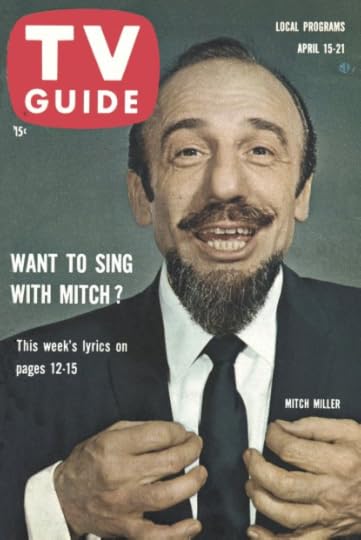 Perhaps it was the fact that we shared a first name, or maybe it was the way he held his arms; Mitch Miller is to conducting what Joe Friday is to walking. Whatever the reason, and we'll probably never know just what it was, I grew up a fan of Mitch Miller. I've been told that I was quite the sight, standing in front of the TV with my legs together, arms stretched out, waving my hands in imitation of Miller's famous conducting pose. Ah, those were the days.
Perhaps it was the fact that we shared a first name, or maybe it was the way he held his arms; Mitch Miller is to conducting what Joe Friday is to walking. Whatever the reason, and we'll probably never know just what it was, I grew up a fan of Mitch Miller. I've been told that I was quite the sight, standing in front of the TV with my legs together, arms stretched out, waving my hands in imitation of Miller's famous conducting pose. Ah, those were the days.Mitch Miller was a singularly unlikely television star. He was a classical oboist, a studio musician, and head of recording for Columbia Records. He worked with, and later feuded with, Sinatra. He certainly had an eye for talent: his discoveries included Tony Bennett, Patti Page, Rosemary Clooney and Johnny Mathis. He had a knack for marketing: in 1954, the producers of Studio One approached Miller in search of a song for a drama they were doing about payola in the music industry. (He was a natural to ask, given Columbia was owned by CBS); he gave them a ballad called "Let Me Go, Devil," and urged them to use an unknown singer (Joan Weber) rather than an established star. The show was telecast (with the song now titled " Let Me Go, Lover "); Miller shrewdly saw to it that store shelves were well-stocked with recordings of the song. It was a smash, and sold 500,000 copies in five days.
He made a few records himself, and had a big choral hit with "The Yellow Rose of Texas." Yes, Mitch Miller was doing pretty well. But there was one thing Mitch Miller didn't like: rock music. It wasn't his kind of music, the music that had been so successful for him for so long; he called it "musical baby food: it is the worship of mediocrity, brought about by a passion for conformity." So he decided to fight back, with what was called the "Sing-along" album, recordings of old favorites with the lyrics printed on the cover so listeners could sing along with Mitch and the gang.
And when Sing Along With Mitch debuted on television in 1961, Mitch Miller became a star.
Sing Along With Mitch was an instant, and surprise, hit, reaching #15 in its first season. It slaughtered The Untouchables (perhaps the most violent program on television at the time). It spawned the successful singing career of Leslie Uggams. It introduced us to Bob McGrath, of Sesame Street fame, who was a longtime singalongers. Not bad.
The show stayed on the air for three seasons, was seen in reruns through 1966. The Christmas specials were always a highlight. The records sold well. Eventually, of course, the British invasion and the rock movement proved too much. But Mitch Miller never really faded away entirely. He was a pretty good, not great, player on Password. He was a frequent guest conductor for the Boston Pops. A lot of people credit Miller with being the progenitor of karaoke. OK, we'll give him a pass on that one.
Today I suppose it's hard to imagine a show like that being a hit, but then back in the day, almost anything was possible on television. It's—well, it's unfortunate that TV, with its astounding technological advances, is in many ways far less advanced than it was when it depended on the incredible creativity of its pioneers. But, as with so many other things, that's a story for another day.
t t t
 This Saturday is a red-letter day in Minnesota: the first home game of the new Minnesota Twins, who used to be the old Washington Senators, back when we had sports—remember those days? The pre-game show begins at 1:00 p.m. on WTCN, and at 1:25 the Twins take the field against the new Washington Senators from Metropolitan Stadium in Bloomington, Minnesota, a suburb located roughly midway between the rival cities of Minneapolis and St. Paul; the team plays there for its first 21 seasons before moving to the Metrodome in downtown Minneapolis. The Met was as good a place as any to watch a ballgame, a stadium that lacked what we’d call the finer amenities, but there were few bad seats in the place.
This Saturday is a red-letter day in Minnesota: the first home game of the new Minnesota Twins, who used to be the old Washington Senators, back when we had sports—remember those days? The pre-game show begins at 1:00 p.m. on WTCN, and at 1:25 the Twins take the field against the new Washington Senators from Metropolitan Stadium in Bloomington, Minnesota, a suburb located roughly midway between the rival cities of Minneapolis and St. Paul; the team plays there for its first 21 seasons before moving to the Metrodome in downtown Minneapolis. The Met was as good a place as any to watch a ballgame, a stadium that lacked what we’d call the finer amenities, but there were few bad seats in the place.Unfortunately, the one thing it lacked was a roof, and when the politicos in Minnesota decided that an indoor, climate-controlled stadium was essential to retain the Twins and Minnesota Vikings, the stadium’s days were numbered. The Metrodome, too, has since bit the dust, being replaced by a new—outdoor—stadium in 2010. Meanwhile, the site of the old Met is now the Mall of America, which shares one thing in common with today’s Twins: right now, neither of them is open. Oh, and by the way, the Twins lost that first home game to the Senators, 5-2. A perennial loser when in Washington (“First in war, first in peace, and last in the American League”), by 1965 they’d be in the World Series.
t t t
Affiliate switch! It’s not as big as the one in 1979, but “Operation Big Switch” prepares the Twin Cities for the swap, effective April 16, with ABC moving from WTCN, Channel 11, to KMSP, Channel 9; Channel 11 will take Channel 9’s place as the area’s independent station. And the first fruits of that change. . .
. . . None other than Hollywood's own red-letter day, the 33rd Academy Awards (Monday, 9:30 p.m., ABC), live from Santa Monica, California. The show’s hosted for the ninth time by Bob Hope, with a star-studded cast of nominees, presenters, singers and dancers filling out the two-hour program, which preempts Peter Gunn. The big winners? Burt Lancaster as Best Actor, Elizabeth Taylor as Best Actress, and The Apartment as Best Picture. I suspect you can catch them all on TCM. I think I’ve mentioned this before, but I always enjoyed having the Oscars on Monday night; like Monday Night Football, it gave you something to look forward to on the toughest day of the week. Moving it to Sunday night has, I think, taken some of the glamour away. As for the argument that Sunday allows for an earlier start (and therefore an earlier end), I have a better idea: make the show shorter. You know their attitude towards us viewers, though: let 'em eat cake.
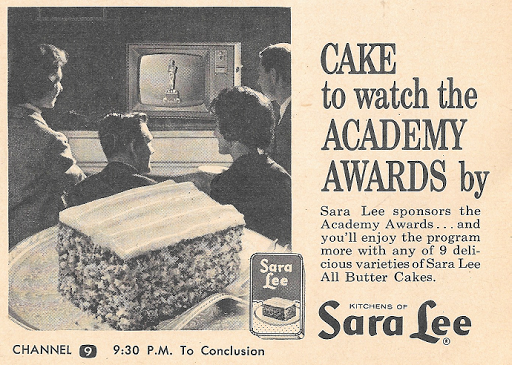
t t t
Sunday's highlights are mostly for night owls At 10:00 p.m. on WTCN, it's the debut of The Oscar Levant Show, with guests Carl Reiner and Jayne Mansfield. For those of you who aren't familiar with him, Oscar Levant was a fascinating bundle of contradictions: he was a prodigy at the piano, studied with Arnold Schoenberg (had he more self-confidence, he could have had a career as a concert pianist; as it was, he was still very good), was a friend of George Gershwin, served as Al Jolson's sidekick on the radio version of Kraft Music Hall, and acted in all kinds of musicals, including The Band Wagon, An American in Paris and The Barclays of Broadway, providing an acidic wit to leaven their hoakiness. It was that caustic, sarcastic humor that he came to be best known for—well, that and his mental health. Oscar was hospitalized several times because of it, and he was quite open and upfront about it; in fact, an episode of The Jack Benny Program features Jack going to Oscar's psychiatrist for troubles with his nerves. Levant often discussed his problems on talk shows like Jack Paar's, where he was a favorite. Oscar Levant was not, I think, a happy man; the fact that he found humor in his problems doesn't disguise the fact that he had them.
If you're still awake after Levant, you might want to stick around for Eichmann on Trial (Midnight, ABC), which replaces the news program Roundup USA for the duration of Adolf Eichmann's war crimes trial. It's a digest of the week's developments at the trial, which began on April 11 and will run through August; Eichmann will be found guilty in a verdict released in December, and is executed on June 1, 1962. Eichmann was one of the most evil of the Nazis, a prime architect of the "Final Solution" agreed upon at the 1942 Wannsee Conference. His trial is big, big news worldwide.
You're going to want to save your energy on Monday for the Oscars, but if you can, watch the prime time premiere of the daytime game show Concentration (8:30 p.m., NBC), hosted by Hugh Downs. Not only does it give working stiffs like us a chance to see the fun, there's a bonus: unlike the daytime version, it's in color! Tuesday night presents the premiere of Walter Matthau's only television series, the police drama Tallahassee 7000 (9:30 p.m., KMSP). As shows go, there's nothing special about it; according to the always-reliable Wikipedia , Matthau did the series "only for the minor inconvenience of making a living," and the bio Matthau: A Life by Rob Edelman and Audrey E. Kupferberg call it "another Matthau career nadir." If you want a Florida-based show, you're probably better off sticking with Surfside 6. Meanwhile, if you've only seen Frank Sutton on Gomer Pyle, you're going to want to check out Wednesday's episode of Naked City (9:00 p.m., ABC), where Sutton and Robert Blake (no surprise) play a couple of psychopathic killers on the loose.
Do you remember how the networks used to do specials when the Ringling Brothers Circus or the Ice Capades would open their seasons? They'd be hosted by someone like Ed Ames, who'd sing a couple of songs and introduce a few acts that would duly impress viewers, and everyone would have a good time. We have one of those on Thursday, as Arthur Godfrey travels to Greensboro for highlights of the Ringling Brothers and Barnum & Bailey Circus (7:00 p.m., CBS). Makes sense, since Godfrey often appears at western shows of one kind or another, doing some dance steps with his horse, Goldie; I saw him at the Minnesota State Fair one year, performing at such a show. He was a crowd pleaser, even when he wasn't appearing on a twin bill with Julius LaRosa. Later one, Pat Boone has his own springtime special (7:30 p.m., ABC), with Dorothy Provine, Fabian, Johnny Mercer, Joanie Sommers, and the Kingston Trio. Saving the best for last, at 9:30 p.m. on ABC, it's another of Ernie Kovacs' monthly specials. The night's heavy on music, with "interpretations" of Tchaikovsky, Bartok and Weill.
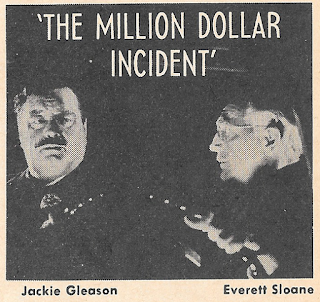 The most intriguing program of the week may well be Friday’s Jackie Gleason special entitled "The Million Dollar Incident” (7:30 p.m., CBS). It is presented to us as a “true” story and is set seven years ago, with Gleason, as himself, bursting into Toots Shor’s and, after a shot of whiskey for the nerves, telling his friend Ed Sullivan (also playing himself) what’s just happened to him. From there we learn that Gleason had been kidnapped by a trio of crooks who planned to hold him for ransom—one million dollars, to be precise, payable by CBS. The crooks are played by Everett Sloane, Jack Klugman and Peter Falk; Gleason himself came up with the story, which was written by A.J. Russell, Sydney Zelinka and Walter Stone, and was directed by Norman Jewison. You can see it at the Paley Center in New York, and it would be a great one (for the Great One) if it was made available for home viewing.
The most intriguing program of the week may well be Friday’s Jackie Gleason special entitled "The Million Dollar Incident” (7:30 p.m., CBS). It is presented to us as a “true” story and is set seven years ago, with Gleason, as himself, bursting into Toots Shor’s and, after a shot of whiskey for the nerves, telling his friend Ed Sullivan (also playing himself) what’s just happened to him. From there we learn that Gleason had been kidnapped by a trio of crooks who planned to hold him for ransom—one million dollars, to be precise, payable by CBS. The crooks are played by Everett Sloane, Jack Klugman and Peter Falk; Gleason himself came up with the story, which was written by A.J. Russell, Sydney Zelinka and Walter Stone, and was directed by Norman Jewison. You can see it at the Paley Center in New York, and it would be a great one (for the Great One) if it was made available for home viewing.t t t
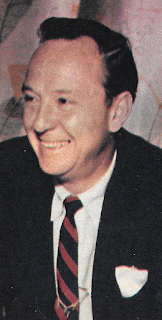 Richard Gehman has an article on John Charles Daly, one of my favorite television personalities of all time, a man now making news rather than reporting it. We know about his remarkable news career, which I wrote about here; Gehman says that over the years Daly became known as a man "who could cover anything from a Presidential tour to the birth of a penguin." His desire to learn as much as he could about a subject, and to find the facts for himself, had made him one of the most learned men in the news business. Not long ago, according to Gehman, a friend had asked Daly about the situation in Laos. He replied with "a 10-minute exposition, peopling it with the principal characters in the struggle for power, giving their backgrounds and forecasting the events of the next few months."
Richard Gehman has an article on John Charles Daly, one of my favorite television personalities of all time, a man now making news rather than reporting it. We know about his remarkable news career, which I wrote about here; Gehman says that over the years Daly became known as a man "who could cover anything from a Presidential tour to the birth of a penguin." His desire to learn as much as he could about a subject, and to find the facts for himself, had made him one of the most learned men in the news business. Not long ago, according to Gehman, a friend had asked Daly about the situation in Laos. He replied with "a 10-minute exposition, peopling it with the principal characters in the struggle for power, giving their backgrounds and forecasting the events of the next few months."But, as the headline says, Daly's now making the news himself. Last year he left his position as news chief at ABC after a dispute about the network's election-night coverage. Sure, there had been disagreements in the last four or five years, but things came to a head on November 8. "When the executives cut into my news coverage to put on two shows, Bugs Bunny and The Rifleman, I felt it was going too far." It's freed him to work full time as emcee of What's My Line? on CBS, a job he's held since 1950. (Even though he was a VP at ABC, the network allowed him to do WML on CBS, a network he had worked for until 1949.) For Daly, hosting the quiz show is "little more than a chore." He arrives at the studio at 10:10 p.m., talks a little with the night's guests, gets some powder on his face for the live broadcast beginning at 10:30 p.m, and leaves the studio at 11:05, five minutes after WML goes off the air.
A half-hour a week hardly enough time to keep a man like Daly busy, so everyone wonders what he's headed for next. Will he go into government? Will he go into newspaper publishing? Daly himself says only that "I've had no vacation for four years. I'm getting some rest now. [And also spending time with his bride, Virginia, whom he married last year.] I don't know how long I"ll rest. But when, one morning, I wake up itchy, I'll know it's time to go back to work." John Daly hosts What's My Line? until its network run ends in 1967. He then spends a year as head of the Voice of America, and works for several years for the American Enterprise Institute. Through it all he remains urbane, avuncular, good-humored; as I've said many times, he's what I want to be when I grow up.
t t t
Do you remember Mark Wilson? I probably haven't thought of him in years, but whenever I see his name in TV Guide, or run across an article like the one in this week's issue, he reappears in my memory as if out of nowhere. Which is appropriate, since Mark Wilson is one of the best-known magicians in the country. For the last three years he's hosted the Saturday morning ABC show called The Magic Land of Allakazam. The article focuses on his work with the animals in his act (Basil the Baffling Bunny, Gertrude the Glamorous Guinea Pig, Charles the Charming Chicken, and more), but if you want to know how he gets them to levitate in his act, don't count on him telling you. "With all the animals sailing into space these days," he says, "we can brag that we do not use a space capsule, and we promise to bring 'em back alive."
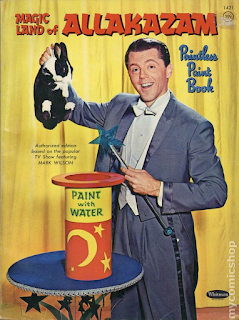 Unlike many of the shows I write about, I can't really tell you much about Allakazam, other than that "Allakazam" (not "Presto!") is the magic word. No, my memory of the show comes from finding a "paintless paint book" in an old cedar chest in our basement about 25 years ago. There were all kinds of things in that chest: old cartoon-character
soaky toys
, scrapbooks, comics and coloring books. We kept the soaky toys and got rid of most everything else in one of the many downsizings we've gone through over the years; part of me is sorry for having gotten rid of it all, but on the other hand it's pretty embarrassing when things like that keep you from fitting into the condo you want to buy, so it's a question of values. We'll always have the memories though, even if we don't have Paris, and the memory I have is of seeing Mark Wilson on the cover of this paint book, where if you dampened the page, the color magically! appears. Even before I found the picture on the right, I could tell you what it looked like: yellow cover, Mark Wilson pulling a rabbit out of the hat, and the word "Allakazam" across the front.
Unlike many of the shows I write about, I can't really tell you much about Allakazam, other than that "Allakazam" (not "Presto!") is the magic word. No, my memory of the show comes from finding a "paintless paint book" in an old cedar chest in our basement about 25 years ago. There were all kinds of things in that chest: old cartoon-character
soaky toys
, scrapbooks, comics and coloring books. We kept the soaky toys and got rid of most everything else in one of the many downsizings we've gone through over the years; part of me is sorry for having gotten rid of it all, but on the other hand it's pretty embarrassing when things like that keep you from fitting into the condo you want to buy, so it's a question of values. We'll always have the memories though, even if we don't have Paris, and the memory I have is of seeing Mark Wilson on the cover of this paint book, where if you dampened the page, the color magically! appears. Even before I found the picture on the right, I could tell you what it looked like: yellow cover, Mark Wilson pulling a rabbit out of the hat, and the word "Allakazam" across the front.So whenever I see Allakazam, I don't remember the show, although I know I watched it; I remember the paint book. It's a pleasant memory, seeing something that you'd forgotten about for so long, I suppose this whole website has been about memories, come to think of it. But then, where would we be without them? I think someone answered that once, but I can't remember what it was. TV
Published on April 18, 2020 05:00
April 17, 2020
Around the dial
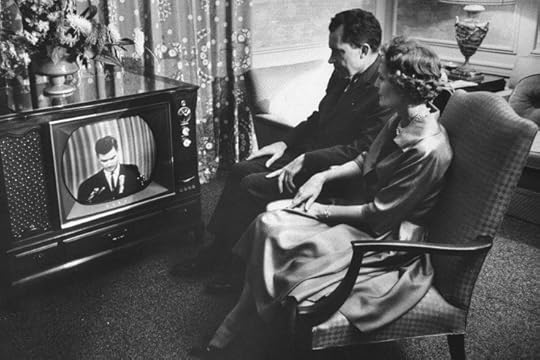 Everyone still hanging in there through all this? As I mentioned a couple of weeks ago, we're fine here; take a moment to drop a line in the comments box and let us know how you are!
Everyone still hanging in there through all this? As I mentioned a couple of weeks ago, we're fine here; take a moment to drop a line in the comments box and let us know how you are!I don't do the grocery shopping in our family, and I doubt they'd let me in some stores right now (only the shopper need enter), but I have fond memories of riding around in the grocery cart basket when I was a kid. At Comfort TV, David brings back some of those memories with a look at how grocery stores have been portrayed in classic television. I do like that old packaging!
It's Wednesday comics week at The Twilight Zone Vortex, and in this week's issue (May, 1971), Jordan gives us a story called " The Man-Beast of Paris ." And no, they're not talking about Andre the Giant here.
Television's New Frontier: the 1960s travels out west to look at the 1961 episodes from Tales of Wells Fargo , starring Dale Robertson. The year covers the second half of season five and the first half of season six, including the show's move to color. That isn't all that moved, though; the network moved the show to Saturdays, up against Perry Mason. Need I mention that it's the show's last season?
We haven't stopped in at Eyes of a Generation for awhile, and I can't think of a better reason to look in today than this color film tour of CBS's Studio 72 in 1954. It was never aired, and features color productions of both The Ed Sullivan Show and Danger.
Speaking of tours, Inner Toob takes us on a tour of Alan Hale Jr.'s career as Jonas Grumby, The Skipper on Gilligan's Island. And if you know how Inner Toob works, then you won't be surprised to see some other areas where Hale pops up--but could that have been, in fact, The Skipper that we actually saw?
At Realweegiemidget, it's time for a look at " Black Magic ," a second season episode of The Bionic Woman, with a guest cast that includes not only Vincent Price (in a dual role!) but also Abe Vigoda, Julie Newmar, and William Windom.
From the mailbag, loyal reader Mark Waldow writes that he collects print ads about local affiliation changes, and wonders if anyone else out there does this. Of course, we went through a few affiliate changes here in the Twin Cities, and I'm going to check on the advertising during an upcoming weekend when I rearrange all my issues of TV Guide. But do any of you have examples you'd like to share? If so, please let me know in the comments or via email.
As for that picture at the top? It's Dick and Pat Nixon, of course, watching the Republican National Convention on TV. There's no date on the picture, but I'm betting it's 1960, the year he's nominated for his first run at the presidency. Something else about this picture; I know that Nixon was a very private man, and I don't think that sharing himself or his feelings came easy to him. You notice that even though they're sitting very close together, there's no physical contact. Now, expressions of public emotion were far less common back then; still, I can't imagine that being the case with my wife and I, regardless of the occasion but especially during such a momentous time. When Pat died, he took it very hard; I think he regretted not having shared more with her. Like him or not, there's always been something very Shakespearian about Richard Nixon, in the most tragic of contexts. TV
Published on April 17, 2020 05:00
It's About TV!
Insightful commentary on how classic TV shows mirrored and influenced American society, tracing the impact of iconic series on national identity, cultural change, and the challenges we face today.
- Mitchell Hadley's profile
- 5 followers



